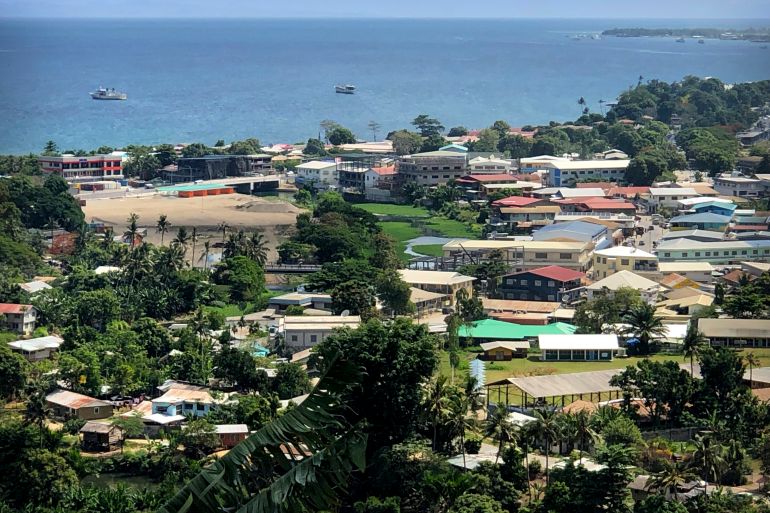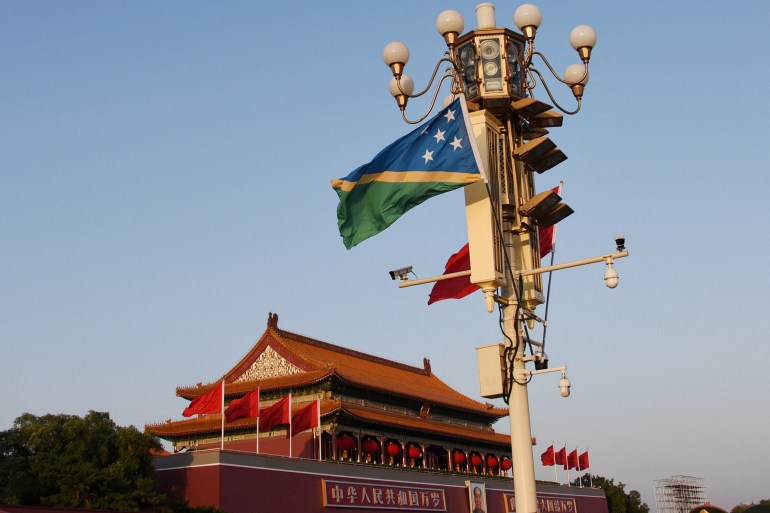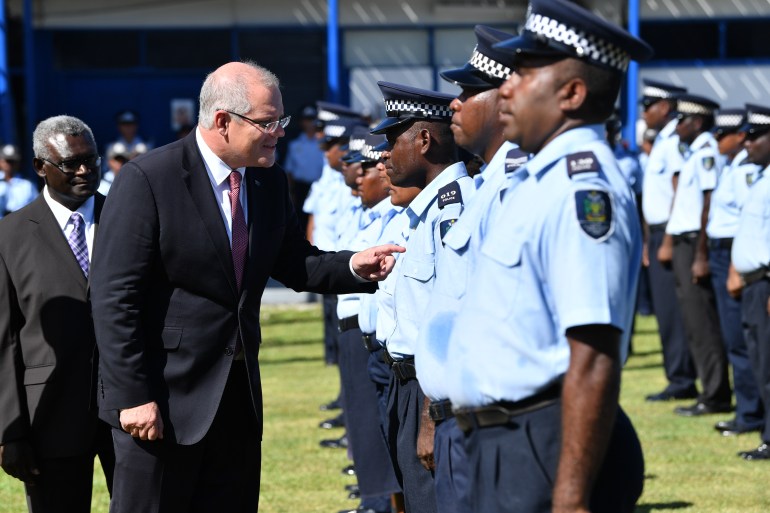Fix poverty first to counter China, Solomon Islanders tell West
Tiny Pacific nation’s underdevelopment leaves it open to influence by bigger powers, local figures say.

The United States and Australia are building new embassies and offering tens of millions of dollars in cash to counter Chinese influence in the Solomon Islands following the signing of a new security pact between Honiara and Beijing that Western officials say opens the door to a Chinese military base in the South Pacific.
But the strategy will not bear fruit until the West addresses fundamental problems in health, education and unemployment that have corroded democratic institutions and allowed China to gain a strong foothold in the tiny South Pacific nation of 700,000 that has one of the lowest Human Development Index scores in the world, according to opposition politicians and community leaders in the archipelago who spoke to Al Jazeera.
Keep reading
list of 4 itemsChina’s GDP, dubious COVID statistics and East Timor’s election
US detention of asylum seekers ‘inhumane and wasteful’: Report
What is in the latest US military aid package for Ukraine?
“To throw money at the country is not what Solomon Islanders need and actually plays into the hands of Prime Minister Sogavare and his pro-China group who will use it for political gain,” Peter Kenilorea, the country’s deputy opposition leader, told Al Jazeera. “They will say this is the reason we signed the pact with China, now we are getting all this money and attention.”
Celsus Irokwato Talifilu, a political adviser for the Premier of Malaita, Solomon Island’s most densely populated province, expressed similar sentiments.
“Australia has been our largest donor since the 1970s and nothing has changed,” Talifilu told Al Jazeera. “At the moment there are many development projects but they have no effect because foreign aid comes through the government and the money simply does not trickle down, especially in the rural areas where 80 percent of the population live.”

Prime Minister Manasseh Sogavare has defended the security deal as necessary to address the “internal security situation” in the archipelago, which has been racked by political unrest, including anti-China riots in November, amid an outpouring of concern by the US, Australia and New Zealand.
Sogavare, who has branded foreign criticism of the agreement “insulting,” has also denied that China will be allowed to establish a military base in the country, which was the site of some of the most consequential battles between US and Japanese troops in World War Two.
“We are not pressured in any way by our new friends,” Sogavare told parliament last month, adding he had no intention of “pitching into any geopolitical power struggle”.
While the official text of the agreement has not been made public, a leaked draft says Honiara may request Beijing send police and military personnel to the country “to assist in maintaining social order”.
A spokesperson for Sogavare did not respond to a request for comment before publication.
China’s foreign ministry has accused critics of “deliberately exaggerating tensions” over the pact, which it has described as a “normal exchange and cooperation between two sovereign and independent countries”.
Aid and infrastructure
China has been making inroads in the Solomon Islands since convincing Honiara to end diplomatic recognition of Taiwan, which Beijing considers part of its territory, in 2019.
Beijing has pledged millions of dollars in development assistance and bankrolled big infrastructure projects, including the National Stadium, a gift to facilitate the country’s hosting of the Pacific Games in 2023.
“There is a thing about us Melanesian people, we only believe what we see,” a member of the Malaita Youth Council told Al Jazeera, requesting anonymity to avoid harming relations with Western aid groups.
“The Chinese build big new things like the National Stadium – things we have never seen before. And they work fast. Whenever a member of parliament asks China for something, they do it quickly because the Chinese have a less bureaucratic approach, and people here like that. But with the West, there is so much red tape. It takes months or years for anything to happen. So the Chinese approach is gaining popularity, winning peoples’ hearts and minds.”
Chinese largesse, however, has also raised fears of so-called debt trap diplomacy among some Solomon Islanders.
“They are now talking about building 200 new Chinese cell phone towers but our service providers say the nation is already covered and either way, the towers won’t be free,” Kenilorea said. “We will have to pay $70m yet they are sold to us as though there is some economic benefit.”
“It’s the same with the stadium and the first synthetic sports track in the country,” he added. “The building is free but we have to maintain it. But we can’t even maintain a grass track or sports field. It will be hard for us just to keep the lights on. Beijing likes grand things and our government has bought into it instead of focusing on health and education.”
Basic services like health and education are where Western donors can really make a difference in the lives of Solomon Islanders and mitigate growing Chinese influence, according to the Malaita Youth Council.
“We have one of the highest premature infant death rates in the world and the lowest percentage of high school graduates in the Pacific,” the Malaita Youth Council spokesperson said. “If Western donors can solve these issues it would change peoples’ perception and pose a real challenge to Chinese influence.”
Kenilorea said people wanted “simple things” like access to electricity, which most Solomon Islanders do not have.
“These kinds of projects are already being done but if they were massively scaled up it would create quick wins for the West,” he said.

Talifilu, whose province has clashed with the national government over its growing ties with Beijing, said Western donors should invest in civic education in the Solomon Islands to counter vote buying, which he claims is bankrolled by China. The Sogavare government has rejected claims of bribery as baseless, suggesting such allegations were aimed at discrediting it “for the sake of justifying criminal actions and political hooliganism”.
“Our democracy is one-sided and flooded with corrupt cash,” Talifilu said. “Our people are not engaged in elections. They just vote for whoever entices them with money. That is the danger when rich countries like China show an interest.”
“What we need is civic engagement,” he added. “Not just a workshop that comes and goes but a permanent presence to create momentum. You have to create demand for transparent government so the people can say ‘look we’ve had enough of this’ and start making demands of their own.”
Kenilorea said rising public discontent could ultimately lead to the axing of the security pact with China.
“It’s looking like the whole platform for the next election will be about China: If the government wins we will have an uptick in Chinese activity in mining, logging and fisheries,” he said. “Basically, more exploitation of our natural resources. If the opposition wins, we’ll review the security pact with China.”
Kenilorea said Australia and the US still hold more sway among the general public than China due to shared values and history.
“JFK was here during the war. And as we are 95 per cent Christian, we already have shared values and understandings,” he said. “That’s why the switch from Taiwan to China, a communist country with strong ideas about atheism, is so unpopular and had to be rushed through [Cabinet].”